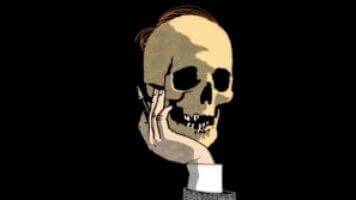Writers imagining interviews with dead cultural icons is nearly a complete disaster

Plenty of books rest on a shaky premise. A book about business written by a crook, an allegory about abstinence disguised as a vampire fantasy, or the plot of any Nicholas Sparks novel work because of something beyond their basic thrust, be it the sweat of a talented ghostwriter, irresistible forward momentum, or romance fantasy fulfilled. These books sell because their purpose is both vague and broad, their appeal simplistic and easily translated. Then there are the books that never rise above the shaky premise. Dead Interviews: Living Writers Meet Dead Icons’ conceit is to have living authors pretend to talk to dead ones. And it’s a complete waste of time.
The first alarm bell is Dead Interviews editor Dan Crowe’s terse introduction addressing the credibility of such a project, which includes the guiding questions for the interviews: “Where are they? Is there a god? How scared should we be?” If several millennia of discourse haven’t resulted in satisfactory answers to these questions, why on earth would Rick Moody’s interview of a dead Jimi Hendrix clear the path? His “exchange” with Hendrix starts the book, with the former, a white man, writing what he believes a black man would sound like. The late guitarist’s first answer: “A cat up here has lots of time to consider, to ponder larger questions.… Dig: beliefs that adhere to your theory of relativity, space-time being curved, clumping, superstring theories, all true.” If this was Moody’s first draft of a below-average Saturday Night Live sketch, that sort of language would be fine. But he’s hazarding a guess as to what Hendrix would say to him from beyond the grave, and is almost certainly not qualified to be the recipient of such information, nor the person to transliterate it.
Cynthia Ozick’s “interview” of Henry James, on the other hand, is baffling and unwieldy. She is hung up on asking about the tabloid-worthy episodes of his past, but never establishes why this is an important line of questioning. These authors may be angling to interview the dead, but they make no case about why we should care.
A.M. Homes invents a proxy: Tom lived next door to the Nixons when he was a child. I hope their fake memories of neighborly kindness are fondly remembered because their written recollections are the equivalent of someone’s very nice mother interviewing America’s favorite disgraced Republican. Sir Arthur Conan Doyle is subjected to Harry Potter-style teleportation by Ian Rankin: “Whoooshh” carries them from monument to monument in Edinburgh, and more fatal than these fanciful flourishes is Rankin’s decision to turn Conan Doyle into a reader of his own work. Is there a greater act of vanity than having an internationally renowned (and deceased) writer say that he’s read your stories?
Filmmaker Rebecca Miller countermands the chance for cleverness or nuance for her exchange with the Marquis De Sade within a few lines:
Marquis De Sade: “Who gave you my address?”
Rebecca Miller: “Inspector Buhot.”
Marquis De Sade: “Fuck off.”
Fuck off indeed.
Joyce Carol Oates out-Oates herself in Dead Interviews. Evangeline Fife (let that name sink in) is Oates’ alter ego, and she spends some time describing what she is wearing, how she is feeling. By the first mention of her damp panties, made wet by sitting next to/speaking with Frost, her participation in the book feels horribly misguided, and casts a powerful retroactive pall on the book. Oates engages in some of the same tactics as her colleagues: strident interrogations about abused children, angry demands for details about affairs. Why write a book like this if most everyone in it has an ax to grind with their subject?
Only one author seems to understand the risks of such a project, and decides, wisely, not to take them. Geoff Dyer puts the entire onus on himself, resulting in the book’s sole bright spot. A chatty, possibly drunk version of himself asks winded and wandering questions of Friedrich Nietzsche. The result is rather like seeing a college friend, deeply immersed in Philosophy 101, having had one too many after midterms and milling about gracelessly, his thoughts and memories of his coursework muddled, his beer intake rising by the second. Dyer’s exchange comes off more like the “Girl You Wish You Hadn’t Started A Conversation With” from SNL, albeit even funnier because his persona is trying so hard to impress his subject, and the latter can only come up with short responses, such as, “I don’t know what you’re talking about,” or, “That’s correct.” Everyone else is in a rush to be some sort of Oprah-style interrogator for the modern age, but Dyer is a welcome reprieve from this mission.
It’s not uncommon for anthologies to be scattershot in quality, but there do exist exemplars of the genre in which writers speak with the dead. Jon Stewart’s imagined exchange between Larry King and Adolf Hitler, as written in his essay collection Naked Pictures Of Famous People, is one such inspired example. It contained this glorious exchange:
Hitler: Look, I was a bad guy. No question. I hate that Hitler. The yelling, the finger pointing… I was a very angry guy.
King: And this… new Hitler?
Hitler: I get up at seven, have half a melon, do the Jumble in the morning paper and then let the day take me where it will. Some days I’ll fish, maybe hit the mall for an Orange Julius.… Me!! The inventor of the Blitzkrieg… When you stop having to control everything, it’s very freeing.”
Don’t print a few thousand first copies unless you’ve got something this good.